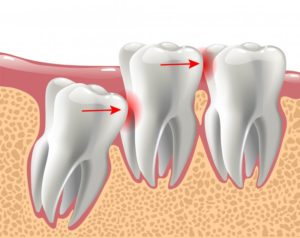What Should You Do About an Impacted Wisdom Tooth?
December 4, 2021
Maybe not to the extent that “root canal” has a bad reputation, but when you hear “wisdom teeth” it may have a negative connotation. That’s probably because you generally think about them having to be removed.
Some people’s wisdom teeth cause no trouble at all. It’s really the impacted version that is the problem. Keep reading to learn what they are, why it matters, and what you should do regarding impacted wisdom teeth removal in Rockledge.
What Does It Mean to Have Impacted Wisdom Teeth?
Impacted wisdom teeth are third molars at the back of the mouth that don’t have enough room to emerge or develop normally. Wisdom teeth are the last adult ones to come into the mouth. Most people have four wisdom teeth at the back of the mouth – two on top, two on bottom.
Why Is It Concerning to Have Impacted Wisdom Teeth?
Impacted wisdom teeth can result in pain, damage to other teeth, and other dental problems. Damage can occur directly if the wisdom tooth pushes against the second molar, or it can increase infection risk in that area. The pressure it applies can cause crowding issues for other teeth.
An impacted wisdom tooth can cause a cyst in the jawbone that can damage it, other teeth, and nerves. Sometimes, a tumor (usually benign) develops.
Partially impacted wisdom teeth are at elevated risk of decay because they are tougher to clean. This particular form of decay causes a painful, inflammatory gum condition called pericoronitis in that area.
What Should You Do If You Have Impacted Wisdom Teeth?
In some cases, impacted wisdom teeth may cause no apparent or immediate problems. When they trigger pain or other dental complications, they are usually removed. Some dentists and oral surgeons also recommend removing impacted wisdom teeth that don’t cause symptoms to prevent future problems.
If you do require impacted wisdom teeth extraction, the first 24 hours will involve pain and swelling, plus potentially lethargy and nausea, after numbing agents wear off. Over the next couple of days, pain and swelling subside. Days 4-7 may involve some jaw stiffness, but you can resume normal activities. Your tooth sockets should close by weeks 3-4 and you should be completely healed by months 3-6.
You can’t keep an impaction from occurring but keeping regular six-month dental appointments for cleaning and checkups enables your dentist to monitor the growth and emergence of your wisdom teeth. Regularly updated dental X-rays may indicate impacted wisdom teeth before any symptoms develop.
About the Author
Dr. Sowmya Kumar joined the dental field relatively late in life when she was in her mid-30s and had two kids. She was looking for a new way to contribute to society in a positive manner while using her knowledge and energy to help others. Eventually, she realized that dentistry was a great fit for her passions! She earned her dental doctorate from the University of Florida. If you ever require wisdom teeth removal, Dr. Kumar offers same-day extractions, walk-in patients are welcome, and dental insurance is maximized. Step one is to schedule an appointment so she can examine your wisdom teeth and make a recommendation. You can do so by visiting her website or calling (321) 631-4334.
No Comments
No comments yet.
RSS feed for comments on this post.
Sorry, the comment form is closed at this time.


